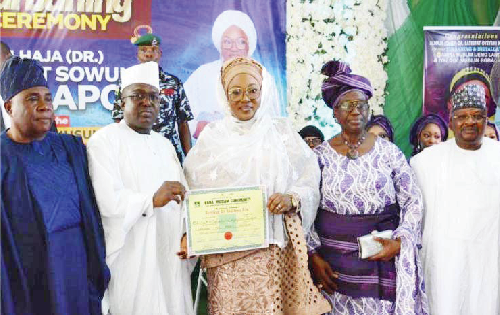Systemic corruption is a major obstacle to stability and economic development in Nigeria.
Estimates show that in the 63 years since independence, corruption has cost the Nigerian economy more than $550 billion. The Economic and Financial Crimes Commission recovered at least $750 million in local and foreign currency linked to corruption and fraud in 2021.
The country’s endemic corruption also contributes to its overall weak rule of law as measured by the World Justice Project Rule of Law Index, which ranked Nigeria 120 out of 140 countries surveyed in the absence of corruption in 2022. Corrupt practices in the justice system often lead to slow and ineffective dispensation of justice.
A newly released global report on the interplay between democracy and corruption points to perhaps Nigeria’s biggest challenge.
In its September 2023 report, an NGO, the Open Society Foundations, traced the failings of democracy in Nigeria to pervasive corruption. This aligns with a global consensus that corruption in Nigeria is endemic and hinders its development.
In a survey of 30 countries across all the regions of the world and 5.5 billion people, the OSF concluded that corruption is undermining democracy in Nigeria and several other countries.
Corruption manifests in every sphere of our national life; most noticeably in elections, the judiciary, government agencies, procurement/contracts, payroll, and in extortion by security agents.
For many, corruption is “the single greatest obstacle preventing Nigeria from achieving its enormous potential.”
On assuming office in 2015, former President Muhammadu Buhari began prosecuting some public officials for diverting the $2.1 billion taken under his predecessor ostensibly to purchase arms to combat the Boko Haram insurgency.
Buhari said $150 billion of oil wealth had also been stolen. His deputy, Yemi Osinbajo, termed the looting “grand corruption,” in which officials went directly to the Central Bank of Nigeria vault to take cash. Buhari said, “If we do not kill corruption, corruption will kill Nigeria.”
Nigeria’s average score in the annual Transparency International Corruption Perception Index 2014-2023 is 27 out 100; it ranked 145th most corrupt out of 180 countries.
The United States-based Center for International Private Enterprise, argues that the anti-corruption war in Nigeria fails primarily because the government is “selective, ineffective and themselves lack credibility.”
PwC says corruption could cost Nigeria up to 37% of GDP by 2030, if not addressed urgently. The United Nations Office on Drugs and Crime said, “Corruption aggravates inequality and injustice, and undermines stability, especially in the world’s most vulnerable regions.”
Once upon a time, the EFCC traced a whooping sum of N34bn to Allison Madueke; Nigeria’s former petroleum minister. Her hidden $37.5m mansion was also uncovered.
A few years ago, $9.8m and £74,000 were recovered from one Andrew Yakubu, ex-NNPC Group Managing Director.
A former governor of Adamawa State, Bala Ngilari, was sent to five years in jail for procurement fraud totaling N167m. Former Director General of Nigerian Maritime Administration and Safety Agency, Temisan Omatseye, was sentenced to five years in prison for N1.5bn contract fraud.
Seventeen exotic vehicles were recovered from ex-Comptroller-General of Customs, Abdullahi Dikko, N50m on former Enugu Chief Judge’s bank accounts was forfeited.
“Nigerians may not have their hopes renewed unless we can identify, isolate and most decisively, brutally deal with those officially-corrupt elements in our midst.”
Nigeria is a hotbed of heinous hogwash. Despite the Fiscal Responsibility Act entrenched as guiding and guarding laws for government workers, there is no delineation between government funds and private accounts. Civil servants and political appointees freely co-mingle public and personal funds without respect for fiscal controls. It is all corruption. It is in the Nigerian spine.
Fighting the powerful is a tough business in a landscape of corruption like Nigeria. Debating corruption in Nigeria has become so ridiculously redundant.
Former President Olusegun Obasanjo established two agencies to combat graft, the Independent Corrupt Practices Commission and EFCC. But his successor, Umaru Yar’Adua, promptly hounded and forced out the Economic and Financial Crimes Commission’s head. Thereafter, most of the state governors accused of treasury looting went scot-free.
The war lost steam under former President Goodluck Jonathan (2010-2015), both agencies were in limbo. Buhari, who came with an anti-corruption image, messed up badly: having no clear plan, he could not appoint a substantive EFCC chairman until late in his second term. Members of his inner circle looted without restraint. Instead of abating, under him, corruption ballooned.
The EFCC however recovered $550 million by stopping ‘ghost workers’ on the public payroll. Buhari also implemented the Treasury Single Account, and recovered $370 million unremitted tax.
But he further undermined the war by pardoning two ex-governors convicted of corruption. A former Accountant-General of the Federation allegedly stole N109 billion from which he returned N30 billion. Despite many court judgements, the government refused to account for recovered assets.
Parliamentary corruption inquiries are frequent and loud, but invariably lead nowhere. Examples are the power sector expenditure, fuel subsidy, and the Niger Delta Development Commission probes. The looters escape with their loot; some later ascend to higher public offices.
Although President Bola Tinubu has not articulated a definite plan yet, he ordered a probe of the Central Bank of Nigeria.
The investigator, Jim Obazee, reportedly discovered how billions of naira were allegedly stolen by a former CBN Governor, Godwin Emefiele and other officials from the CBN’s accounts including a “fraudulent cash withdrawal of $6.23 million” – about N2.9 billion at the then official exchange rate of N461/$.
In the UK alone, the special investigator said his probe led him to 543.4 million Pounds kept by Emefiele in fixed deposit accounts. He also said Emefiele manipulated the Naira exchange rate and perpetrated fraud in the e-Naira project of the CBN.
Fighting and winning war on corruption in high places is, beyond doubts, one of the indices which Nigerians are using to assess the resolve of the Tinubu administration.
Nigerians may not have their hopes renewed unless we can identify, isolate and most decisively, brutally deal with those officially-corrupt elements in our midst.
To defeat graft, President Tinubu must fashion and implement a pragmatic plan.
He should not be deluded; without taming corruption, he cannot transform Nigeria.

